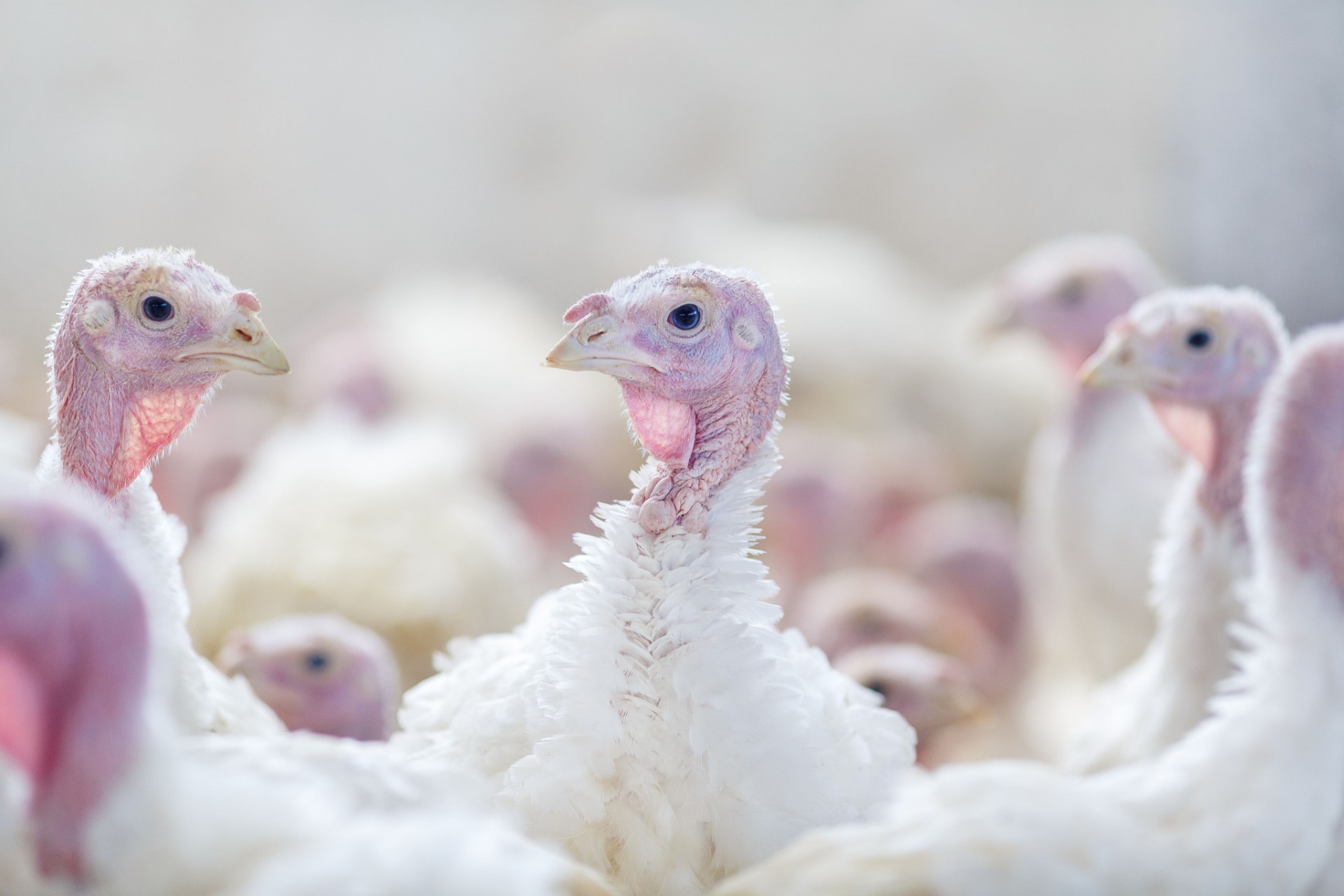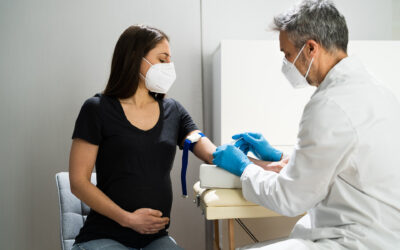Case Study
In-feed Antibiotics Alter Turkey Intestinal Microbiota and Metabolome Compositions
Metabolon helps identify modulation of microbiota and metabolome in turkeys receiving in-feed growth-promoting antibiotics.
Metabolomics combined with 16S rRNA sequencing demonstrate that antibiotic-induced changes in turkey intestinal microbial structure are predictive of the cecal metabolome, indicating a connection between the microbiome and metabolome.
Metabolomics combined with 16S rRNA sequencing demonstrate that antibiotic-induced changes in turkey intestinal microbial structure are predictive of the cecal metabolome, indicating a connection between the microbiome and metabolome.

Antibiotics have long been used to address disease and improve feed efficiency (a measure of weight gained per amount of food consumed1) in food animals. Despite 70 years of wide-spread antibiotic use in the livestock industry, in 2017 many antimicrobial compounds were banned from being used to promote growth. This prompted livestock workers to search for antibiotic alternatives that could aid in maintaining animal health, growth, and fecundity. While we do not fully understand how antibiotics increase poultry performance and feed efficiency, it has been shown that changes in gut microbial populations impact the gut metabolic profile, leading to changes in the gut environment that ultimately improve feed efficiency.1,2 Identifying the functional changes within the microbiota may elucidate alternative approaches to promote animal growth without providing selective pressure for antibiotic resistance.
The Challenge: Functional Effects of Antibiotics on Microbiota Not Fully Understood
While the effects of antibiotics on microbial diversity have been well-studied in humans and animals3–5 and led to important observations in the structure of the microbiota community, fewer studies have characterized the physiological effects antibiotics impart on the microbiota.
Studies in metatranscriptomics and metabolomics suggest antibiotics may alter the metabolic activity of the microbiota. A study in antibiotic-treated mice demonstrates that antibiotic-mediated alterations of the gut microbiome convert the global metabolic profile to one that favors C. difficile germination and growth.6 Only a few studies have explored the metabolome in poultry production systems, thus more studies are needed to investigate associations between metabolite production and the microbiota. Elucidating why antibiotics, like bacitracin methylene, encourage animal growth is imperative to changing feed approaches and optimizing feed efficiency.
Metabolon Insight: Cecal Metabolite Changes Identified with In-Feed Antibiotic Use
To understand the effects of bacitracin methylene disalicylate (BMD) on turkey intestinal microbiota and intestinal metabolite composition, turkeys were randomly assigned to one of three treatment groups: no antibiotic control, subtherapeutic BMD (50 g/ton of feed), or therapeutic BMD (200 g/ton) for 14 weeks.7 Bacterial communities in the turkey jejunum, ileum, and ceca were monitored using 16S rRNA gene sequencing, while the Global Discovery Panel was leveraged to determine BMD’s effects on the cecal metabolome.
The study found that gut location, age, and in-feed BMD treatment all impacted turkey microbiota such that investigators found distinct bacterial communities in the jejunum, ileum, and ceca. In-feed BMD significantly altered the diversity of cecal bacteria in a dose-dependent manner throughout study duration.
The study also demonstrated an in-feed BMD (dose-dependent) impact on the cecal metabolome. Untargeted metabolomics analysis revealed 712 metabolites in turkey ceca (524 were present across all groups and time points). Cecal metabolite profiles of turkeys receiving subtherapeutic and therapeutic in-feed BMD doses were significantly different on day seven and day thirty-five. Metabolites detected across all groups throughout the course of the study demonstrated the impact of the BMD diet: 69% of metabolites were differentially present in BMD-treated turkeys for at least one time point, suggesting global impacts on microbial functions. BMD-affected metabolite profiles changed over time. Amino acids, carbohydrates, nucleotides, peptides, and lipids decreased in the turkey ceca early after BMD administration, but changes also persisted after BMD treatment stopped. Amino acid metabolic concentrations in turkey ceca were significantly altered with BMD treatment. In fact, this was the most impacted category of metabolites (Figure 1). Tryptophan metabolites were amongst the compounds most predictive of both BMD treatment doses (35, 78, and 84 days).

Figure 1. Counts of cecal metabolites that were differentially (q < 0.1) present in the animals given subtherapeutic (upper panel) or therapeutic (lower panel) in feed BMD compared to the control animals. Researchers observed generally similar trends in the therapeutic and subtherapeutic groups, but to a lesser extent in subtherapeutic animals. Panel upper labels indicate days after start of BMD diets.
Copyright: The copyright holder of Figure 1 is the author/funder of Johnson et al., 2019. It is made available under a CC-BY 4.0 International license.
Bacterial abundance patterns correlated with more metabolite concentrations (especially amino acids and nucleotides) in the control group compared to either BMD group, indicating potential microbial metabolic pathways disrupted with in-feed BMD. For example, in the control group, 27 species were correlated with at least three metabolites, while only five to six species were associated with three or more metabolites in BMD groups.
The Solution: Antibiotic-Induced Changes in Microbial Composition Predictive of Cecal Metabolome
Thanks to Metabolon’s untargeted metabolomics analysis coupled with 16S rRNA gene sequencing, this study demonstrated that in-feed BMD causes changes in the cecal microbiota community that correlated with the cecal metabolomic composition.
The Outcome: Bacterial-Derived Metabolic Shifts May Be Responsible for Effects of Growth-Promoting In-Feed Antibiotics
In-feed BMD use influences intestinal bacterial membership and function in a dose-dependent manner. The microbiota composition correlates with the metabolomic composition, suggesting that microbiota shifts may be driving metabolite shifts. These findings improve our understanding of the microbiota functional output as well as the various compounds interacting with the host.
The clear connection of in-feed BMD use and its impact on microbial structure and functional metabolites represent potential targets for further studies. Future investigations into the specific impacts of growth-promoting antibiotics on the metabolic pathways of intestinal bacterial populations will help determine if the BMD-induced changes in tryptophan metabolites promote turkey health and improve the health and production of other animals.
References
1. Dibner JJ, Richards JD. Antibiotic growth promoters in agriculture: history and mode of action. Poult Sci. 2005;84(4):634-643. doi:10.1093/ps/84.4.634
2. Shabat SK, Sasson G, Doron-Faigenboim A, et al. Specific microbiome-dependent mechanisms underlie the energy harvest efficiency of ruminants. ISME J. 2016;10(12):2958-2972. doi:10.1038/ismej.2016.62
3. Dethlefsen L, Huse S, Sogin ML, Relman DA. The pervasive effects of an antibiotic on the human gut microbiota, as revealed by deep 16S rRNA sequencing. PLoS Biol. 2008;6(11):e280. doi:10.1371/journal.pbio.0060280
4. Looft T, Allen HK, Cantarel BL, et al. Bacteria, phages and pigs: the effects of in-feed antibiotics on the microbiome at different gut locations. ISME J. 2014;8(8):1566-1576. doi:10.1038/ismej.2014.12




